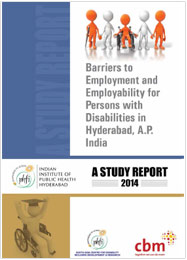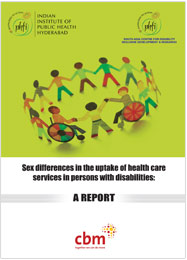The South Asia Centre for Disability Inclusive Development & Research (SACDIR)
“Inclusive Millennium: Evidence for Empowering Persons with Disabilities“.
A centre of excellence was established under the aegis of the Public Health Foundation of India (PHFI) in collaboration and support from the London School of Hygiene and Tropical Medicine (LSHTM), and its component institution, the International Centre for Eye Health (ICEH), London, UK.
The mission for the Centre is ‘Inclusive Millennium: Evidence for Empowering Persons with Disabilities’.
The World Health Organization (WHO) estimates that, globally 650 million people live with some disability (physical, mental, visual, hearing, learning, speech and intellectual) and 80% of this burden is in low/middle income countries. The Census 2001 in India estimated that 22 million people suffer from disability (2.2%) and 15% of them are children less than 16 years of age. It is now understood that disability is a public health problem but efforts to deal with it using a public health or health systems approach is negligible or lacking.
Though there are a large number of extremely successful service delivery initiatives in the South Asia region, there has been very little effort in looking at Disability from a public health perspective. This leads to a paucity of evidence on the prevalence and magnitude of disability and valid evaluation of interventions. With resource constraints increasing every year, it is important to look at the costs and effectiveness of interventions. Such an approach allows a larger proportion of the population to benefit from successful interventions.
The Objectives of SACDIR
- Develop the evidence base for understanding the magnitude of disabilities within the South Asia context;
- Train and reorient health care personnel to concerns of persons with disabilities;
- Organize modules on application of the International Classification of Functioning (ICF) recommended by WHO;
- Run short course training modules on disabling conditions & inclusive development;
- Develop a Masters Course in Disability Management & Research
- Conduct high quality need-based epidemiological, operations, sociological and outcomes-based research to improve the quality of life of persons with disabilities;
- Evaluation of existing programs for persons with disabilities in India and other South Asian countries;
- Develop innovative modalities for identifying persons with disabilities and providing appropriate care;
- Advocate at appropriate congregations and forum for disability inclusive development;
- Assist and influence policy development initiatives to foster disability inclusive development in the country and the region.
Highlights
The Centre was formally launched on 3 October 2010. Mr Javed Abidi was the Chief Guest and Dr P V Ramesh, Principal Secretary Health, Govt. of Andhra Pradesh, Dr R. Pararajasegaram, Advisor Sightsavers International and Prof. Andrew Smith, ICEH, LSHTM, London were the guests of honour at the launch. Prof. K. Srinath Reddy, President PHFI presided over the launch meeting which was attended by 150 guests.
Themes: 4 broad areas of functioning
Provide leadership to efforts for augmenting the evidence base for effective planning and implementation of programmes for disability in the South Asia region. Research networks will be developed with research partners in the region. A number of internationally and nationally funded research projects are currently being undertaken with support from ICMR, CBM and Sightsavers. The International Centre for Eye Health, London School for Hygiene and Tropical Medicine is collaborating closely with SACDIR.
The first ever Short Course on Public Health Planning for Hearing Impairment in South Asia was conducted in October 2010. It is proposed that this course be offered annually. It is also proposed to offer a Masters level programme in Disability Management & Research from 2011.
Short courses on Research Methodology in Disability, Programme Planning for implementing public health programmes for visual impairment will be offered from 2011. Research skills of partner organisations like CBM will be augmented through hands-on skill development workshops.
In collaboration with Govt. of Andhra Pradesh, CBM, Lions Clubs International Foundation, National Programme for Control of Blindness, Society for Elimination of Rural Poverty (SERP), Sangath and Sightsavers, evaluation of existing programmes is being undertaken. The Centre will expand the network of institutions for collaboration over the next couple of years.
SACDIR will provide evidence for policy formulation and advocacy with supporting organisations. He Centre will work closely with the Govt. of Andhra Pradesh and other State Governments to support activities for empowering people with disabilities in the region.
Current Research Projects
Using Key Informants for Identifying Children with specific disabilities: Funded by CBM and undertaken in partnership with ICEH, LSHTM, London, the project is currently being implemented in Bangladesh and Pakistan. The Principal Investigator for the Project is Dr GVS Murthy.
The project was initiated in 2008 and will be completed in 2012. Based on the learning from the project, it is proposed to adopt the method for wider application in developing countries.
Mortality among Cataract Blind: This project is funded by Sightsavers and is being undertaken in collaboration with ICEH, LSHTM, London and LV Prasad Eye Institute, Hyderabad.
The study involves recording the mortality experience among a cohort examined in Andhra Pradesh, 10 years ago by LV Prasad Eye Institute, Hyderabad (APED Study). Data collection has been completed.
Incidence of Blindness in Andhra Pradesh: Funded by LV Prasad Eye Institute and Sightsavers International, the study is a collaborative study with ICEH, LSHTM, London and LV Prasad Eye Institute, Hyderabad. The study will be completed by 2012.
The original APED Study cohort will be followed up to determine the cumulative incidence of blindness and visual impairment.
Child-to-Child approach for vision and hearing impairment: This study is funded by Bernadotte Foundation and is being implemented in collaboration with ICEH, LSHTM, London and the Vivekanand Mission Hospital, Haldia, West Bengal.
The study aims to identify the best modality to engage children in identifying persons with visual and hearing impairment in their families and neighbourhood.
Effect of UVR on ocular morbidity in India: This study is funded by ICMR and was initiated in November 2010. This is a multi centric study coordinated by the Dr R.P. Centre, AIIMS.
Training Activities
The first short course on Public Health Planning for Hearing Impairment was organised from 4th-8th October 2010 at Hyderabad. 40 participants from 6 countries were enrolled for the course. The course was conducted with support from ICEH, LSHTM, London and was funded by CBM, Germany and CBM, India.
The Team
- Dr. GVS MurthyDirector, IIPH-Hyderabad
- Dr Uma AysolaDeputy Director, IIPH-Hyderabad
- Dr. Neena JohnAssistant Professor
- Dr. Shailaja TetaliAssistant Professor
- Dr Suresh KamalakannanAssistant Professor
- Mr. Hira BallabhLecturer
- Ms Jayanthi SagarResearch Assistant

